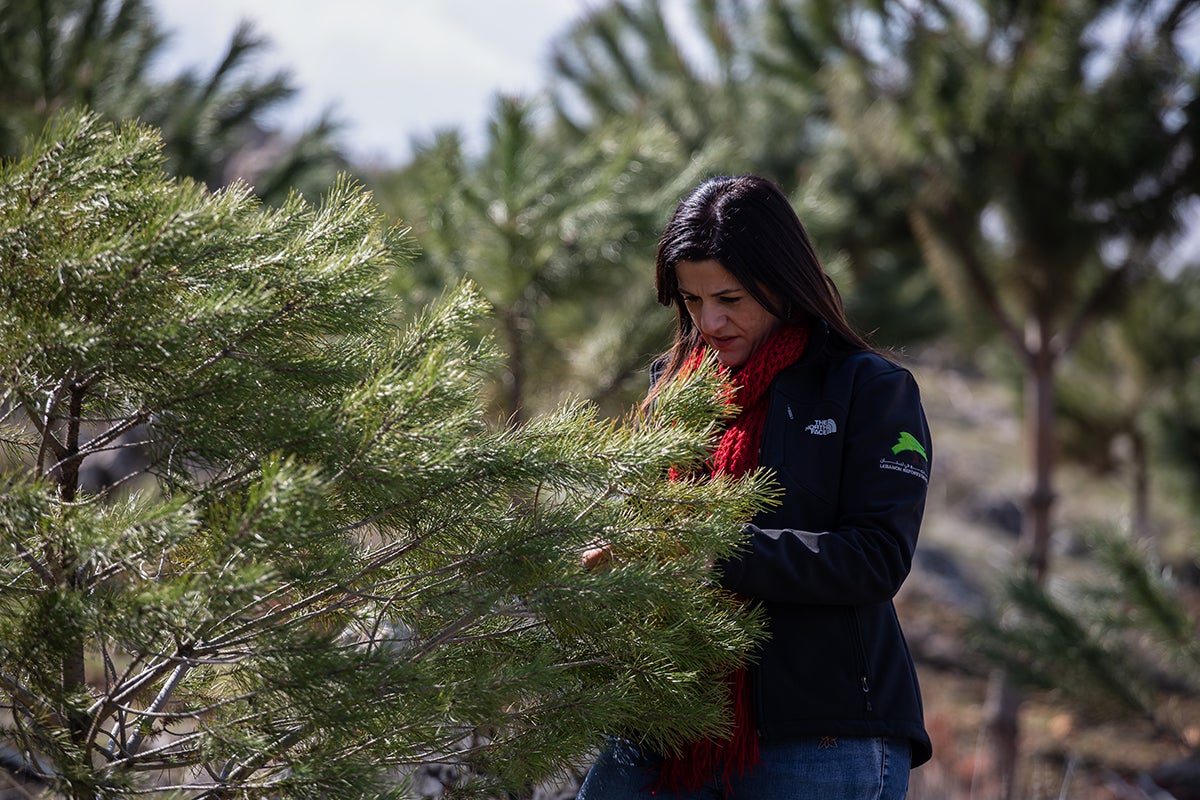Maya Nehme a woman in forestry preserving Lebanon’s trees
Date:
Dr. Maya Nehme, 41, is the Director of Lebanese Reforestation Initiative, a local NGO which aims at conserving and expanding Lebanon's forests through a community-based approach and public-private partnerships. As wildfires in Lebanon have exponentially increased since 2019, reforestation, forest management, wildfires management and land use planning, are needed more than ever.

Maya Nehme was born and raised in a house with a garden. As a child, she spent a lot of time outdoors with her father, planting and caring for this green space. “Agriculture is my passion; this is where I can give my very best,” she said.
Nehme studied Agricultural Engineering at the Lebanese University earned a master's degree in Plant Protection from the American University of Beirut, before holding a dual-title degree in Entomology and Comparative and International Education from Penn State University. When she returned to Lebanon, she worked in agricultural development and forestation management, in the context of a USAID-funded project, the “Lebanese Reforestation Initiative.” As the project ended, she was determined to continue reforestation efforts and launched a non-governmental organization (NGO), the Lebanese Reforestation Initiative (LRI) and became its director as of 2015. “I manage the organization and coordinate with donors ongoing and upcoming projects, and I build partnerships with other NGOs and the government, at the local and regional level. Every now and then, I still make time to plant trees, which thrills me.”
“Since 2019, fires in Lebanon have exponentially increased. Until 2018, we had an average of 1400 hectares per year of fire damage and in 2019, it increased to 2900 hectares. 2020 was the worst year; since the fires damaged 7200 hectares, a clear indication of the impact of climate change, which prolongs drought, increases the precipitation and concentration of rain.”
Nehme explains that in Lebanon, fire outbreaks are primarily caused by human activity, “either farmers burning dead plants in their gardens, municipalities getting rid of waste in forests, or careless individuals abandoning campfires or even launching fireworks.” She adds, “we work on fire prevention, raising awareness on the causes and dangers of fires, and we provide follow-up on post-fire recovery and rehabilitation. Prevention and planning activities can help contain the spread of fire. In 2022, we are planning workshops with national stakeholders to discuss the gaps and support for better preparedness.”
Through its different projects, the LRI has successfully planted more than 1.3 million trees across Lebanon and managed more than 3000 hectares of land, including conducting planting and fire prevention activities. “Despite many fire outbreaks in the last few years, they did not spread to the areas where we had completed prevention activities,” Nehme said “We work with more than 150 towns on forestry projects, which also help build trust between communities. In Lebanon, natural reserves are not connected as they used to be. We have mapped all the communal lands and identified spots suitable for forestation, and we started reforesting in these areas to create this connectivity again,” she added.
When Nehme first started working in forestry, some people found it odd to see a woman digging a hole, planting a tree or supervising other men. Ten years ago, in some communities, women were forbidden to work alongside men “and now they are part of the committees we have established in different municipalities,” she said.
Nehme thinks climate change is real:
“We need to act fast; we cannot keep silent. Let us every day contribute to reducing emissions and waste. Let us start by asking simple questions: Do I have to drive my car every day? Can I compile all my errands? Can I reduce my plastic use? We don't have to plant a million trees, but each one of us can plant a tree once a year or grow a small plant. These simple actions can go a long way if we take them seriously. It’s a collective effort. It’s about saving ourselves, humanity and our planet.”
Nehme believes climate change talks and environmental awareness should be included in the curriculum at schools and universities. This will help younger generations become more conscious of their environmental responsibility and understand that forests are ecosystems providing economic and health benefits. She notes, “youth can volunteer, plant and prune. By staying engaged and spreading the word about the long-term impact of climate change, they help create conversations that are essential to preserving the environment.”
Recently the LRI hosted the “Youth Conservation Corps”, a six-month residential training program in partnership with the US Forest Service. Thirty youths - 13 girls and 17 boys - within 18-24 years - received training on forestry, natural resource management and career development, at LRI’s center in Ehmej. When the program was completed, many were motivated to work in the field.
Nehme is surrounded by inspiring people who are committed to mitigating the impact of climate change and who remind her every day that small things are the most critical. Many of LRI team members work to apply a zero-waste strategy, at their offices.
In Lebanon, the number of women specialized in forestry, is not significant, even though the three major NGOs working in forestry, are led by women. “There is a gap in academia, as the Lebanese University is the only higher-education institution to provide a master’s degree in forestry. My team of experts includes more women than men, while this sector is traditionally dominated by men, worldwide,” said Nehme. She added, “at the level of LRI’s projects, there is an equal share of men and women working in the field of forestation in towns. Over the years, we’ve seen heads of municipalities focusing on the need to include more women force in local committees, which we willingly do. This is a success on its own.”
She concludes: